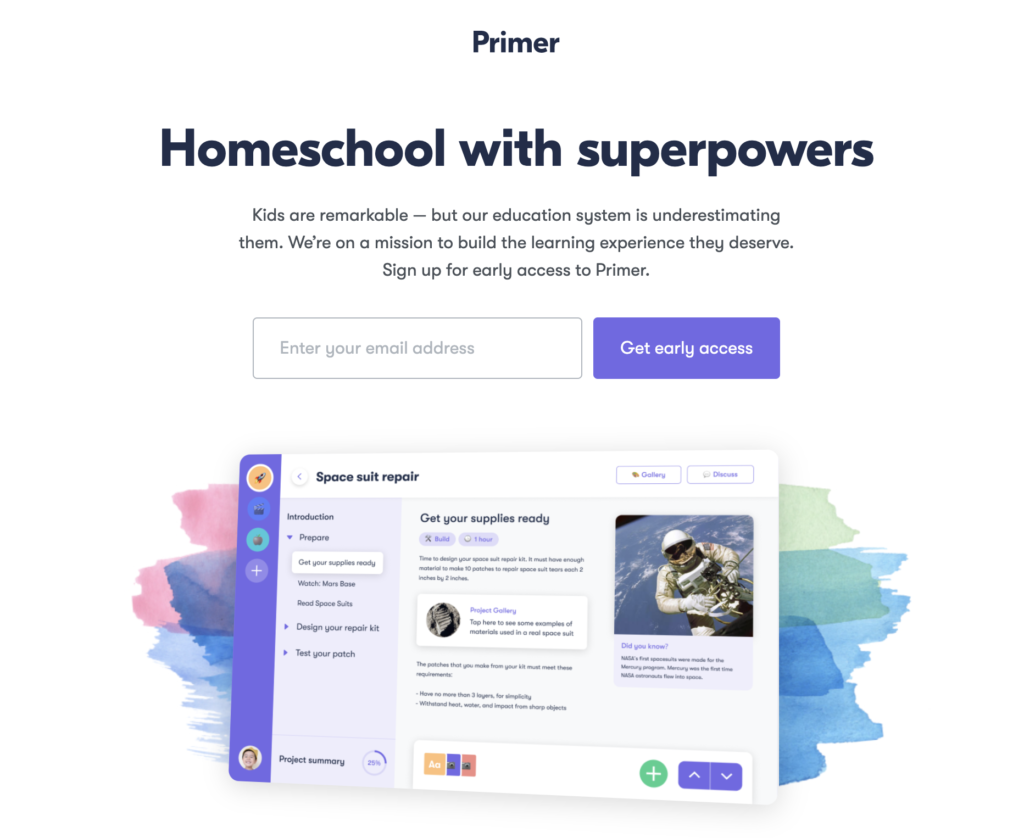On homeschooling
When I grew up homeschooling was not popular. In California and other states there were even laws passed to discourage homeschooling. We knew quite a few families who had left California and moved to Idaho over increasing anti-homeschooling legislation. Popular opinion was that homeschooling should only be legal for those with teaching credentials.
Even in a traditionally limited government state like Idaho, the homeschooling community was forced to lobby the state legislature to not restrict the freedom to homeschool.
But it wasn’t just the legal side. As a kid out running errands with my mom during the middle of the day random people would come up to us and say, “Shouldn’t you be in school?” When I responded, “I’m homeschooled” I might as well have said, “I don’t believe in school” based on the looks they gave.
Or those who didn’t give us a hard time still always asked one question, “So…do you have any friends?”
The assumption was not only that I couldn’t get a good education, but that I’d also turn out as an antisocial loner.
The great homeschooling experiment
But now the world has changed. Over the last couple decades homeschooling has moved more and more mainstream. And then starting two months ago nearly every one of the 74 million kids in the United States got a taste of homeschooling. For many it’s been a sudden and rough transition, but I bet many people—in this case millions of kids and their parents—are getting a small spark that, “huh, maybe there’s something to this homeschooling thing!”
If that’s you, my goal is to convince you to take that random idea and strongly consider it. Homeschooling isn’t right for everyone, but for many it’s worth a serious consideration.
I was homeschooled. This is my resume.
For those who have read my blog none of this will be a surprise, but for anyone new this may be some helpful context. If it sounds like bragging, sorry. It’s just the facts (that I’m proud of).
- I’m the 4th of 6th kids.
- We were all homeschooled grades K-12.
- I graduated high school at 15.
- In high school a girl I was dating got me interested in web design.
- I went to college first for graphic design, then switched to marketing.
- I did freelance web design on the side and dropped out of college at 17 when I got my first $10,000 web project.
- I got married at 18. Hilary and I just celebrated 11 years together.
- I wrote and self-published 3 successful books before turning 23.
- I founded ConvertKit, my email marketing software company, at 22.
- Today ConvertKit has a team of 58 people and $22 million a year in revenue.
- INC Magazine named us the fastest growing company in Idaho 2 years in a row and this year the fastest growing software company in the United States.
- I’m currently 29.
- I am a firm believer in homeschooling.
- I have three boys (8, 6, and 5 months), the older two go to a school that is half private school / half homeschool.
With that context out of the way let’s dive in to why I think homeschooling is a great idea and hope it will continue to become more popular.
Why homeschooling worked for me
The class moves at the pace of the slowest student: You
Normally class moves at the pace of the slowest student while those who understood the concepts quickly become bored and stop paying attention or start causing trouble.
In homeschooling class always moved at my pace. Sometimes that was really quickly as I would breeze through subjects, other times the pace was really slow when I just wasn’t getting it (chemistry in particular).
Because it was personalized to me I was always engaged.
In fact, I was always responsible for getting my school done. My mom was there to help and tutor, but as I got older she made it clear that I set the pace and was in charge of my learning. I could play LEGO or go outside once I finished.
Once, when I was 11 or 12, it was snowing the most perfect giant flakes—you could almost see the snow getting deeper—and I was stuck inside working on school. My mom saw me staring out the window rather than at my math. “You know, school doesn’t have to take a set amount of time” my mom said, watching me perk up she added, “the sooner you complete your work, the sooner you can go sledding.”
You’ve never seen a more focused 12 year old.
I quickly worked through my math lessons, finished reading and spelling, and even stayed focused through my writing assignments—which I told mom were a waste of time since I was never going to be a writer. An hour and a half in, school was done and I was sledding through piles of beautiful, fresh snow.
There is no speed limit
A couple years later I asked my mom a seemingly obvious question: “How long is high school?” Before she could respond, I continued, “is it four years or is it a set amount of school work?”
Growing up I made friends who were older than me. That didn’t matter until they were halfway through high school and starting to make plans for college. The age gap became obvious when I realized they would leave for college and I would be left behind. Hence the question: “how long is high school?”
My mom replied, “I guess it’s a set amount of work.”
“Great! I’m going to need that listed out.”
To my mom’s credit, she was happy to. Since I had older siblings who had already completed high school she was able to compile a list of what I needed to complete in order to graduate.
Once I had my new todo list I got to work. My goal was to complete all four years of high school as quickly as possible in order to catch up to my friends and not be left behind when they went to college.
Each summer we would drive 8 hours from Boise to Seattle to visit family. I remember thinking, “I’m bored when I do algebra, and I’m also bored on road trips. Why not combine the two?” Since my older siblings were in the car I could ask them for help whenever I got stuck. I was able to churn through dozens of math lessons as the western landscape flew by.
Not long after turning 15 I had completed my mom’s todo list, passed my entrance exams and was accepted to Boise State University. While I learned plenty in school, the most important lesson will always stick with me:
There is no speed limit. You set the pace.
You are responsible for your own education
If you don’t get your school done, who’s fault is that? I think everyone would say you—the student—are responsible, but they don’t act like it. You see, in traditional schools they give you all of the downside and none of the upside. Get bad grades? Take remedial classes. Finish early? Wait for the other kids.
My parents made me responsible. Yes, they helped me whenever I needed it, but if I didn’t get my school done I felt the consequences of missing activities with friends or having to stay inside and keep working. But I also—and this is critical—got the upside of doing well on school. I could pick subjects I was interested in, design some of my own assignments, choose books I was interested in, and go at my own pace.
If I wanted to get all my school done early in the week and have a long weekend, that was fine. Or work harder and graduate a few years early, that was fine as well. They made me fully responsible, which meant I had the downside and the upside.
My boys sometimes really struggle on homeschooling days (all kids do) to get school done. When that happens we make it clear that while we are there to help, it’s their responsibility to make sure it all gets done. So when they are rude or unfocused we just say, “it seems like now isn’t the best time to help you” and move on to something else. Though they know that if they don’t finish their school at home they’ll have to do it during recess instead of playing with their friends.
Talk to me like an adult
One day I went with my mom and siblings to Shopko. I had saved up some money and wanted to buy LEGO, so I asked mom where they were in the store. She said, “I’m not sure, but that gentleman works here, why don’t you ask him?”
I was 10 years old and very shy, so that was the last thing I wanted to do. But my desire to buy a new LEGO set overcame my shyness and I walked over to ask.
Then something strange happened: he got knelt down to my level in an exaggerated way and said in a weird, high pitched, excitable voice, “Well, hello there! So you want to buy some LEGO? They’re over there!”
It’s hard in written words to do justice to how strange and condescending his tone was. As I walked back to my mom completely confused I overheard him turn and talk to another customer in a completely normal voice.
I was so confused. When I asked my mom what his deal was, she just said, “Some people feel the need to talk to kids that way.”
Looking back I understand why it was so out of place. Until that moment, no one had ever talked to me differently because I was a kid. My parents never talked down to me or belittled my questions or ideas. Explanations were kind and respectful: I was treated like an equal.
At the same time people would always remark to my parents, “Wow, your kids are so well spoken!” That was simply because we had a ton of practice in normal conversations!
Homeschooling encourages this respectful relationship between parents and kids. It is more than just the class or the format, its a way of interacting with your kids as equals and partners in their own learning.
A love for learning
While I certainly still complained about school, I realize now that my upbringing developed a love for learning—not school—learning. We would spend a ton of time reading and I would leave the library with a towering stack of books, hoping they would last the two weeks until we would come back.
So much learning happened outside the official subjects:
- Starting a business selling woodworking projects to neighbors and at art fairs.
- Building and launching model rockets to learn basic trigonometry.
- Reading. So much reading. Some books were assigned, but really we were encouraged to read anything we were interested in. My parents modeled that constantly as avid readers themselves.
- Always being encouraged to write, even though I tried to convince my mom I’d never be a writer.
…and so much more.
We spent a fraction of the time on school and homework than a public school kid, and I believe we got more out of it. Instead we filled time with free play and self-directed learning.
The results
Earlier I shared some professional accomplishments and how I believe homeschooling has set me up for success, but what about for the rest of school? Could my siblings and I really keep up with our traditionally schooled counterparts who spent 3x as much time on their education?
To test that we sat for national standardized tests every other year and consistently tested in the 95th to 99th percentiles for our grades.
I was never a star student, but I was equipped for success. I didn’t go on to get incredible grades in college, but I did just fine with a 3.2 average GPA. Not bad for starting at 15 and dropping out at 17.
Ultimately I’m so grateful for the incredible time and energy my parents invested in me and my education.
“Never let school interfere with your education”
— Mark Twain (Or Grant Allen)
I don’t think that homeschooling is right for every family or every kid, but I do think it’s worth considering. So if you’re one of those millions of families forced into the great homeschooling experiment and wondering if you should continue it next fall, here’s just one small vote to say I think you should give it a try!
Homeschool with superpowers
Last fall my friend Ryan Delk told me about the homeschooling startup he wanted to build to help kids unlock a true passion for learning. That was before a global quarantine and school closures brought homeschooling to the forefront of the conversation.
I’m thrilled to join Primer as an investor to see the impact they can have on kids and parents worldwide to help with homeschooling. If you want to learn more read Ryan’s announcement post and then join the early access list.




Really enjoyed this post Nathan. My brother and I were also homeschooled, although for only part of the way. But those years spent homeschooling laid a huge foundation for every bit of success I’ve had in my life. I’m so grateful my parents chose that for us.
Sounds like you had some amazing parents as well and I’m really glad to see homeschooling get taken more seriously. I too faced many questions about “shouldn’t you be in school!”
Haha.
Really appreciate you sharing this and excited to see what Primer does!
Nice piece, Nathan. I’m a retired public school teacher and my wife and I have always believed in the power of homeschooling. Certainly your piece illustrates those benefits. I also like that hybrid model your kids are in. Anyway, impressive accomplishments by you during your school years and a pat on the back to both you and your wife for your consistency as parents. Not easy nowadays. You deserve a dozen Guru donuts!👌 One of our lasting memories of a fun three days in Boise in 2015.
I love this. Thanks for sharing, Nathan! I was also homeschooled K-12 and had a similarly foundational (yet socially unpopular) experience that set me up for any success experience today or in the future.
Primer looks like a great project, how can I support the mission?
Thanks for sharing your experience, Nathan. I homeschooled my daughter when she decided that she wasn’t a fan of the middle school BS she was seeing in 6th grade. She’s always been super intuitive like that – haha. It allowed her to learn music and be in a band, travel the country playing club volleyball and take college classes at 16 in an effort to save money on college through dual-enrollment. It allowed me to teach her life skills, show her what running a company is like, and spend way more time with her than most parents. Needless to say we’re super grateful!
Great post Nathan. I’m a dad who is homeschooling his 3 boys (10/6/4) as well. I’ve loved reading your writing online and we’re currently teaching our boys the power of writing and being able to “Show Your Work”. It’s inspiring to see how you’ve used the habits you’ve learned in homeschool to build and thrive with ConvertKit and your previous work building an audience online. Thanks for everything Nathan! You’re an inspiration for me to “Show My Work” and set an example for my sons.